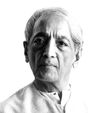It had been a dull, heavy day; the clouds were pressing in and it had rained violently. The red riverbeds had some water in them but the land needed lots more rain for the big catchments, tanks, and the wells to get filled up; there would be no rains for several months and the hot sun would burn the land. Water was needed urgently for this part of the country and every drop was welcome. One had been indoors all day and it was good to get out. The roads were running with water, there was a heavy shower and under every tree there was a puddle and the trees were dripping with water. It was getting dark; the hills were visible, they were just dark against the sky, the colour of the clouds; the trees were silent and motionless, lost in their brooding; they had withdrawn and refused to communicate. One was aware, suddenly, of that strange otherness; it was there and it had been there, only there had been talks, seeing people and so on and the body had not had enough rest to be aware of the strangeness but on going out it was there and only then was there a realization that it had been there. Still it was unexpected and sudden, with that intensity which is the essence of beauty. One went with it down the road not as something separate, not as an experience, something to be observed and examined, to be remembered. These were the ways of thought but thought had ceased and so there was no experiencing of it. All experiencing is separative and deteriorating, it is part of the machinery of thought and all mechanical processes deteriorate. It was something, each time, totally new and that which is new has no relation whatsoever with the known, with the past. And there was beauty, beyond all thought and feeling.
Thought shattering itself against its own nothingness is the explosion of meditation.
There was no call of the owl across the silent valley; it was very early; the sun would not be over the hill for several hours yet. It was cloudy and no stars were visible; if the sky were clear, Orion would be this side of the house, facing west, but everywhere there was darkness and silence. Habit and meditation can never abide together; meditation can never become a habit; meditation can never follow the pattern laid down by thought which forms habit. Meditation is the destruction of thought and not thought caught in its own intricacies, visions and its own vain pursuits. Thought shattering itself against its own nothingness is the explosion of meditation. This meditation has its own movement, directionless and so is causeless. And in that room, in that peculiar silence when the clouds are low, almost touching the treetops, meditation was a movement in which the brain emptied itself and remained still. It was a movement of the totality of the mind in emptiness and there was timelessness.
Thought is matter held within the bonds of time; thought is never free, never new; every experience only strengthens the bondage and so there is sorrow. Experience can never free thought; it makes it more cunning, and refinement is not the ending of sorrow. Thought, however astute, however experienced, can never end sorrow; it can escape from it but it can never end it. The ending of sorrow is the ending of thought. There is no one who can put an end to it [to thought], not its own gods, its own ideals, beliefs, dogmas. Every thought, however wise or petty, shapes the response to the challenge of limitless life and this response of time breeds sorrow. Thought is mechanical and so it can never be free; only in freedom is there no sorrow. The ending of thought is the ending of sorrow.
